attention!It is sometimes difficult to recognize the signs and symptoms of helminths in humans, and treatment can go down the wrong path because helminth infections are very similar to the symptomatic pathology of certain gastrointestinal diseases, including liver, gallbladder disease, and other infectious diseases.
Mode of infection
- Through the surface layer, the soil where the parasites lay their eggs;
- through contact with infected domestic or wild animals, birds or aquatic animals;
- Contaminated food without adequate heat treatment;
- Large numbers of worm eggs end up in open water, which is also a source of infection;
- In some cases, bites from stinging or blood-sucking insects are the source of infection.

Parasitic diversity
- Pinworms are parasitic and free-living nematodes whose favorite habitat is the human intestine. These worms live in the small intestine or cecum and reach the ileum where they mate. After the female is fertilized, the male stops his life activities, and the pregnant female, filled with eggs, continues to pass through the rectum and crawls out from the lower opening of the digestive tract. Pinworms lay eggs in the perianal folds of the anus and then die. This full-body exercise lasts about a month. Passing through the gastrointestinal tract has consequences. Symptoms and treatment of worms in humans depend on a disease called enterobiasis, the most common type of helminth infection.
- Roundworms are round, dioecious worms with a total length of up to 40 cm. Sexually mature females lay more than 200, 000 eggs. Their favorite place is the gastrointestinal tract, especially the small intestine. Roundworms cause helminthic symptoms in humans, the symptoms and treatment of which are defined as ascariasis - a type of helminth infection. The free movement of parasites can irritate the small intestine, affecting its patency. By parasitizing the internal organs, roundworms not only affect the gastrointestinal tract but are also uninvited guests in the respiratory and/or genitourinary system. Cases of tapeworm invasion into the frontal sinuses, nasolacrimal ducts, and external passages of hearing aids have been documented.
- Trichinella spiralis is one of the variants of the protostome round parasitic helminth whose larval stage begins in the elastic tissue of the musculature, after which mature individuals are transported to the small intestine. Infection with this roundworm can lead to the fatal disease trichinellosis. Symptoms, treatment, and diagnosis of worms in human muscles depend on facial swelling, rash, myalgia, and blood eosinophilia. More severe clinical pathology is characterized by damage to internal organs and the central nervous system. Identifying Trichinella spiralis in humans is difficult. All symptoms occurred without any complications. It is possible to identify symptoms of worms in adults only after penetration of the central nervous system - treatment in this case is aimed at restoring neurological disorders, such as ataxia or respiratory paralysis.
- Intestinal Giardia is a protozoan flagellated parasite that can cause protozoa to invade the human body, mainly damaging the small intestine, and is the causative agent of giardiasis. By adhering to the walls of the digestive organs, parasites feed on the products of breakdown. Mature Lambia's favorite dishes are flour and sweets. Parasites are excreted in the feces in the form of spores and enter the external environment. Often, during biochemical laboratory tests during treatment for adult worms, it is discovered that giardia cysts enter the body through chlorinated tap water.
- Another trigger of helminth infection is whipworm, which can affect the organs of the gastrointestinal system, causing trichotillomania. A fertilized female parasite can release up to 10, 000 eggs in a day. The larval development of whipworms does not require an intermediate host. Worms that enter the body can damage the colon mucosa, causing acute illness. In some cases, whipworms are a precipitating factor in inflammation of the appendix of the cecum (i. e. , appendicitis). The long-term presence of parasites can lead to anemia.
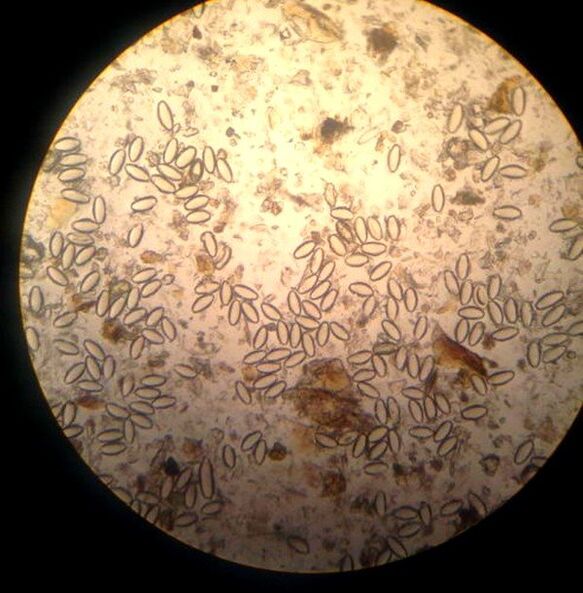
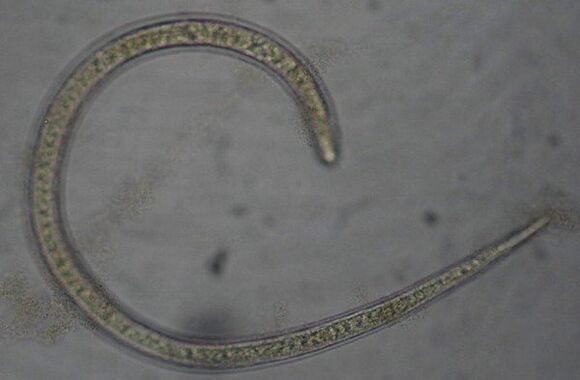
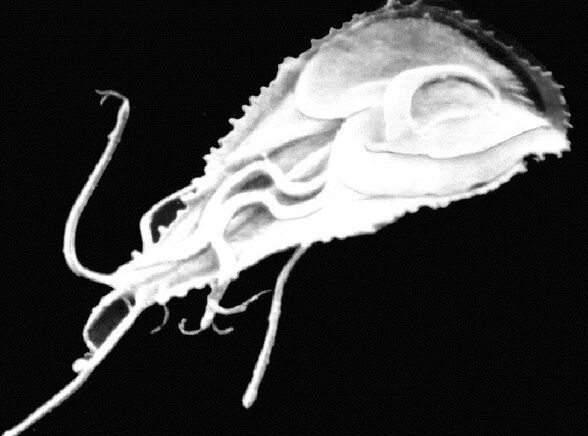
Recognize the signs and symptoms of infection
- Pale skin;
- General weakness of body;
- Dizziness;
- Itching of the anus;
- Intestinal disorders;
- allergic reactions;
- Phase changes in body temperature.

attention!One characteristic of the long-term stay of parasitic worms is a dramatic weight loss in the worm carrier.
Home test for worm detection
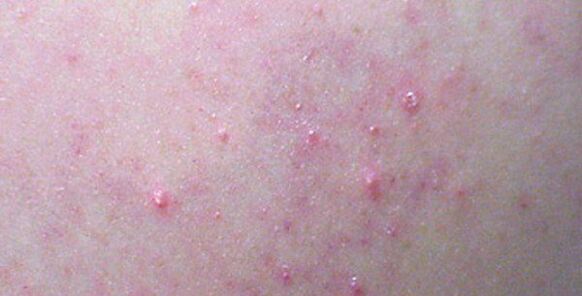
- Do you have a rash on your body that you didn’t have before?
- Do you frequently suffer from bloating, gas, diarrhea or constipation;
- Whether the itching of the anus persists;
- Do you often experience headaches or dizziness during the day?
- Is there a sudden urge to feel sick or a gag reflex;
- Do you have intermittent sleep for no apparent reason?
- Whether the lymph nodes are swollen;
- Whether there is swelling in the legs;
- Are you concerned about ongoing fatigue and fatigue;
- Are the mucous membranes of your eyes yellowish?
- Do you experience a persistent bitter taste in your mouth?
- Any symptoms of allergies - cough, rhinitis, asthma;
- Do you feel constant pain or heaviness in your stomach?
- Whether the temperature changes without cause;
- Whether there are preschool children in the household;
- Have pets or birds?
- Whether the muscles and joints are sore independent of physical activity;
- Do people around you complain about your snoring or grinding your teeth at night?
- Completely indifferent to food?
- Do you often forget to process raw vegetables and fruits?
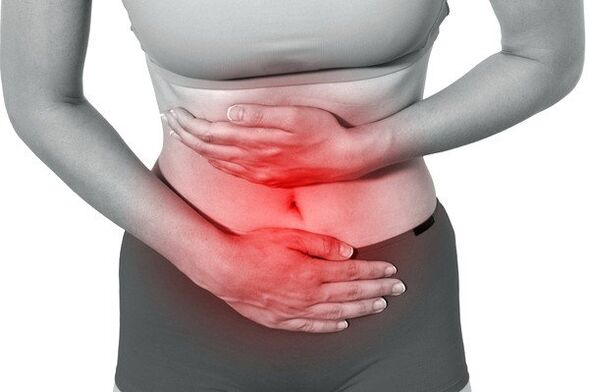
lung damage
attention!Worms in the human lungs are considered a very dangerous and rare disease - in this case, symptoms, treatment and signs must be determined in the early stages of the infection, which is quite difficult.
- Episodes of nausea and/or vomiting;
- Difficulty breathing;
- Wheezing in the lungs;
- Difficulty breathing;
- Increased body temperature;
- Expectorant cough, etc.

Worm infection in the visual organ
How to Get Rid of Parasites: Treatments
- A synthetic benzimidazole broad-spectrum anthelmintic, widely used to treat whipworms, pinworms and other manifestations of intestinal infections caused by nematodes. Active absorption of drugs into the systemic circulation can deplete glycogen stores in the parasite's tissue structure. Treatment duration and dosage are determined in consultation with an infectious disease specialist or parasitologist.
- Imidazothiazoles are dosage forms with anthelmintic properties and active immunostimulatory effects. Drug treatment paralyzes the parasite's muscle structure, inhibits its fumarate reductase enzyme and impairs the worm's bioenergetic activity. The drug is used as an anthelmintic when the following diagnoses are established: Trichostrongyliasis, ascariasis, toxocariasis, nematodessis, etc. Treatment dosage and duration are determined based on individual characteristics.
- Pharmacological agents of benzimidazole anthelmintics. The drug works by blocking and paralyzing the nerve endings of the worm parasite. Muscle paralysis does not allow the worms to attach to the intestinal wall and feed on the products of decay. The emergence of parasites occurs in a natural physiological way. This dosage form is available for free at pharmacies. However, it is recommended to consult a doctor before use.
Traditional medicine helps
- onion;
- dandelion;
- Burdock;
- nettle;
- carnation;
- Tansy;
- garlic;
- Wormwood etc.

- A half-liter jar is filled with chopped onions in the middle and filled with vodka or alcohol solution. After a day of exposure, the drug is filtered and used for its intended purpose. Take 2 tablespoons 4 times daily for one week.
- Pour the crushed pomegranate rind into a glass of vodka or diluted alcohol. This medicine is taken once daily, one tablespoon every 3-4 hours.
- Decoction of green walnut shells is very useful. The product is crushed in a mortar, poured into alcohol and left to soak for 2-3 days, until a distinct brown color develops. Take one tablespoon one hour before meals.
- Boil two cloves of chopped garlic in 200ml of milk until completely dissolved. Take one dose of this medicine before meals.
- Add one teaspoon of mugwort to 250 ml of boiling water and let it cool before use. The filtered liquid should be taken one hour before meals, three times a day.

Prevent worm infection
- Wash hands with soap before eating, after walking and after handling animals;
- Food must be heat treated before consumption;
- Street kebab and seafood vendors should be avoided.


























